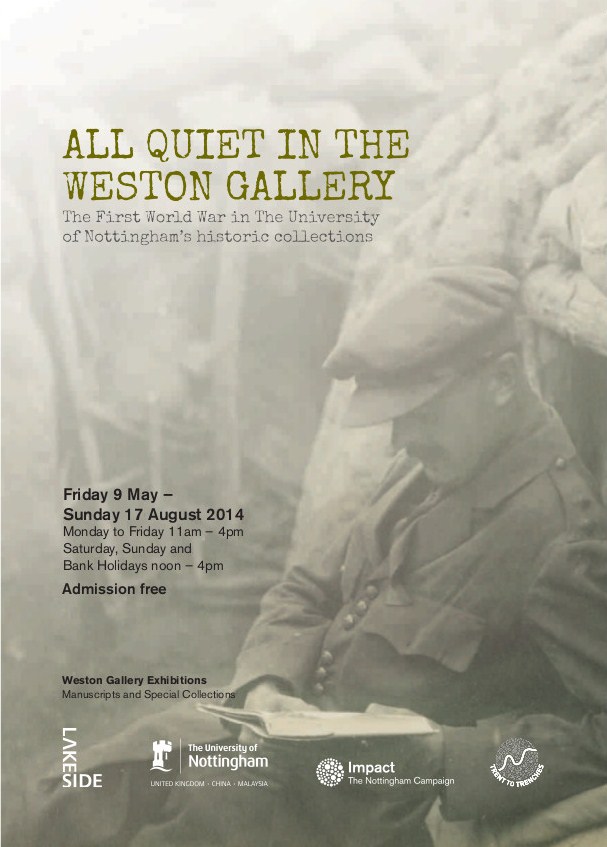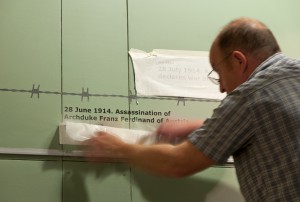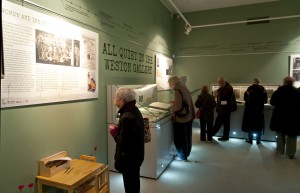
May 20, 2014, by H Cotterill
All Quiet in the Weston Gallery: The First World War in the University Of Nottingham’s historic collections.
2014 is the hundred year anniversary of the outbreak of the First World War and a nationwide programme of events is planned to commemorate the conflict. As part of this, last week saw the opening of our First World War exhibition in the Lakeside Arts Centre’s Weston Gallery. The exhibition examines different perspectives on the war, from the soldier on the battlefield to the worker in the munitions factory, from the volunteer nurse to the wife and mother, and from the British Tommy to the German Fritz.
As curator of the exhibition one of the most difficult decisions was deciding which themes to explore. The scale of the conflict, the hundreds of different interpretations and attitudes towards it, both contemporary and modern, mean that no exhibition can hope to tell the whole story of the war. Ultimately the themes that we have chosen have been determined by the material in our collections. Personal papers such as photos, letters and diaries are combined with official records to show the effect of the conflict on the lives of ordinary people. The exhibition looks at the war’s impact on business, student life, literature and the place of women. Contemporary attitudes to the conflict are also examined, from the propaganda of recruitment images to post-war efforts to memorialise the dead.
One of the highlights of working on the exhibition has been getting the chance to discover the personal stories behind items in our collections. The papers of a former student at the University College, the forerunner of The University of Nottingham, revealed a letter sent to her by a former classmate turned soldier. The soldier, who signs himself only as ‘Bob’, is writing about the death of a friend ‘Bill’. Further investigation revealed that these two men were 2nd Lieutenant Robert Wilford and 2nd Lieutenant Arthur William Wilkinson. Together with a third man, 2nd Lieutenant George Ducker, they had been students at the College and appear to have enlisted together. The three friends fought together in the Yorkshire Regiment before Bill, and later Bob, were killed. Both Bill and Bob are listed on the University’s war memorial. The fate of George is unknown, though the lack of an entry on a war memorial suggests that he survived the war. Other highlights in the exhibition include material belonging to a Nottingham man living in German-occupied Lille and a collection of letters sent by six brothers who were serving on the front line.
The exhibition runs in the Weston Gallery, Lakeside Arts Centre until the 17th August.
A series of talks will be held to accompany the exhibition. Places are limited so please book in advance with the Box Office on 0115 846 7777
Tuesday 20 May, 1pm-2pm: Cigarettes, Soldiers, Sailors and the British Home Front: the war and the tobacco industry.
One of the abiding images of the First World War is of soldiers smoking in the trenches of the Western Front. The images could also be of soldiers in Gallipoli or Mesopotamia, or of sailors on watch. Although German U-boats hit hard imports to Britain, tobacco was imported and processed to maintain morale. Soldiers and sailors received Christmas tins of tobacco from the state, and on the Home Front people sent tobacco, cigarettes and even cigars to their loved ones in the armed forces. Emeritus Professor Chris Wrigley looks at the ubiquitous presence of tobacco during the war and its impact on the tobacco industry.
Wednesday 25 June, 1pm-2pm: ‘Why I changed my name and did my duty’ – one family’s experience of WW1.’
Everybody has heard of the futile slaughter on the Somme, at Verdun, Passchendaele and Ypres, the trenches, ‘shell shock’ and the 1914 Christmas truce. But what made men volunteer, why did they go on fighting, how was morale maintained in such appalling conditions? Emeritus Professor Malcolm Jones looks at how the experience of individual soldiers could vary immensely, as illustrated by the stories of the three Vince brothers and their families.
Thursday 24 July, 1pm-2pm: The First World War: a test of manhood or the collapse of humanity?
This lecture given by Professor Roger Woods of the German department will look at how German autobiographical accounts written in the Weimar years by nationalists, communists, pacifists, and deserters cut across this divide to reveal surprisingly similar mentalities.
No comments yet, fill out a comment to be the first



Leave a Reply